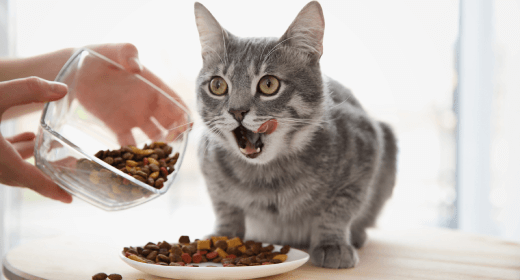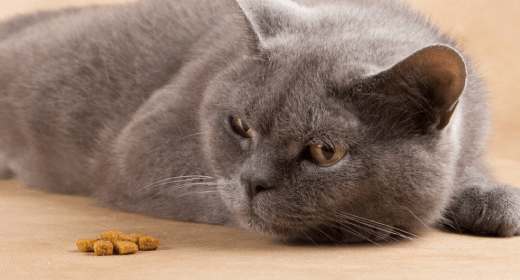

Taurine is an important component to all IAMS™ cat foods, such as IAMS ProActive Health™ Adult Original with Chicken.
Taurine is an essential amino acid that is critical for normal heart muscle function, vision, and reproduction in kittens. It is also needed to form the bile salts that aid in digestion. Unlike other amino acids, taurine is found as a free amino acid in body tissues such as the heart and eyes and is not incorporated into proteins
Most mammals manufacture taurine from other amino acids. However, cats cannot manufacture enough and, therefore, must acquire enough additional taurine through diet to meet their needs. In pet food, taurine is naturally found in animal-based protein ingredients and can also be added separately.
Taurine helps in maintaining normal vision, heart muscle function, digestion, normal pregnancy and fetal development, and a healthy immune system. Taurine for cats can only be found in animal-derived proteins.
Taurine can be made by dogs from two other amino acids: cysteine and methionine. As a result, it isn't regarded necessary in their diet. But since taurine is an important ingredient, you can add it to your pet’s diet due to its numerous health benefits.
Taurine criteria for commercial dog food have yet to be established. If you are worried that your dog may have inadequate taurine or if you need guidance on how much taurine to include in your dog's diet, it is best to consult your veterinarian.
It is vital to include taurine in your cat’s food because cats cannot synthesize it. If your cat's food has too little taurine, it will become taurine deficient, which can lead to a range of major health concerns. For example, taurine could cause your cat’s retinas to degenerate and make your pet go blind. Further, this lack of taurine can stifle growth and make it difficult for you cat to reproduce.
Therefore, the minimum taurine requirement for adult cats in commercial pet food is 25mg/100 kcal for dry food and 50mg/100 kcal for canned foods, according to the Association of American Feed Control Officials Publication, 2018. However, because taurine requirements vary from one cat to the next, it's always a good idea to check with your vet if you're concerned that your pet isn't getting enough.
IAMS dry cat foods also include taurine as an ingredient to supplement the primary source of this amino acid, which is animal-based protein from sources such as chicken, egg, lamb, and fish. However, these sources can vary in their taurine content, and adding more taurine is a sound approach to ensure optimal taurine levels.Ü
Health benefits of Taurine
Taurine is an amino acid found in muscles, the heart, the brain, and the retina, among other tissues and organs. Unlike most amino acids, taurine does not form cell proteins but has a variety of other functions. Here are some taurine benefits for cats:
Taurine deficiency can cause serious health problems for your cat over time because it is required for many regular metabolic functions. Some of the issues include:
IAMS cat foods are formulated with high-quality, animal-based proteins as their primary ingredient. In addition, they are supplemented with extra taurine to ensure balanced levels of essential amino acids.
IAMS Proactive Health Healthy Adult with Chicken and Salmon are one of the best foods to feed your cat. This nutrient-dense cat food is available in chicken and salmon flavors. These food ingredients act as the first ingredient to promote a healthy body for play. It also contains natural fiber and prebiotics, which help your cat's digestion. What’s more is that it helps your cat develop strong muscles with rich amounts of protein and provides a complete and balanced diet with no fillers.
Taurine has no significant side effects and is well-tolerated by cats when added correctly. The only side effect reported is minor vomiting which is lessened by providing a supplement with food.
In the late 1980s, taurine was discovered to be an essential component of a cat's diet. Since then, all cat foods have been enriched with plenty of taurine to suit their individual demands.
A high number of cats given unfortified commercial foods suffer from taurine insufficiency. Because cats can't absorb all of the taurine in processed foods and/or can't synthesis the difference between absorption and demand, taurine is considered an essential amino acid for cats.


Cats are known to be finicky and picky about a lot of things. Their pickiness in terms of toys and activities is fine and completely natural; if it extends to their eating, things could get a little concerning. If your cat is a picky eater, you can try a few remedies such as serving them different food items. If they still turn away from the food served, you should consult a vet. However, before drawing any conclusions, it is necessary to understand that it is in a cat’s nature to be fussy. And while your feline friend may be stubborn initially, they tend to adapt to a set routine eventually. So, here is a brief guide to help you better understand your cat’s pickiness about food.
There are certain reasons why your cat turns from the food served. This behaviour may not necessarily indicate that your cat is a finicky eater.
If your cat is refusing to eat food served to them, it is possible that they are not hungry. Some possible reasons for this could be that they have been munching throughout the day and have had a lot of treats. If your cat does roam around outdoors by themselves, it is entirely possible that they switched to their hunting instincts and caught prey.
If you notice your cat has not eaten in more than 24 hours, it might be a sign of an underlying weakness and it is best to consult a vet in this matter.
Improper routine
Despite being finicky, cats are creatures who thrive on routine. So, when it comes to their daily feeding, it is best to establish a routine and stick to it. If your cat is not served meals at regular times, they may refuse to eat.
If you have not cleaned your cat’s serving plate before pouring in their food, they may not enjoy the meal. Cats may refuse to eat out of a soiled bowl or plate, so ensure that your pet’s serving dish is always clean.
A lot of cats tend to enjoy eating alone. They do not like consuming meals in the presence of others or being the centre of attention during meal times.
If your cat starts eating less, you may want to look for a factor that could be causing stress. Has another animal been added to the household? Has a family member left or died? Have the cat's surroundings changed, such as a move to a new house? When the stress is removed, your cat will probably go back to a normal diet. If your cat seems healthy, happy, and lively, and has a good coat and clear eyes, there is little cause for concern. Cats also have an uncanny ability to smell changes in the world around them. Even a new bowl can disturb a cat's eating habits. Some cats refuse to eat from plastic or hard rubber bowls.
Medical factors also could contribute to a change in your cat’s eating habits. The only way to verify this is to visit a veterinarian. If the medical examination does not verify that a problem exists, your cat may be manipulating you in grand style!
If your cat is a picky eater and it’s tough to get them to finish a meal, here are some tips you could try:
Heat wet food before serving
Cats have a strong sense of smell and enjoy food by its aroma. If the wet food you served them has gone cold, it may not give off the aroma that cats love. So, heating the meal a little may help.
Clean the serving dish/bowl
Since cats have a strong sense of smell, they will know if their serving bowl is unclean. If so, it can quickly kill their appetite and they may turn away from the food. So, ensure that you always serve meals to your cat in a clean dish/bowl.
Add chicken broth/tuna water/cat oil to their food
Try to entice your cat to eat food by adding a little amount of warm chicken broth, tuna water, or cat oil to the meal. This will significantly improve the smell of the food for the cats. However, do be sure to never serve anything containing onions, chives, or garlic, as these ingredients can be harmful to a cat.
Try different foods
If your cat is still refusing to eat, it may be time to change the food. You may have to try a different product and hope your pet likes the new one.
If despite trying everything your cat still won’t eat, it is time to consult your vet. Also, if your cat has gone more than 24 hours without eating anything, you should visit the vet immediately as your pet could be ill.
If your cat is set on a routine that needs to be changed, make the change slowly and gradually. Your cat may not like a sudden switch in things and can continue to refuse to eat. If you wish to switch your fur baby over to different food, start off by mixing a little quantity of the new food with their current food, over the span of a few days. Gradually, increase the quantity of the new food item until it is the only thing being served.
Switching to a new cat food can be tough. IAMS™ recognises that caring cat owners want to have the option of feeding their pet a more varied diet. IAMS cat foods offer a number of nutritional choices for your cat, including dry and canned foods, naturally preserved diets, and options for overweight cats or cats with reduced activity levels. All IAMS™ cat foods are complete and balanced for specific lifestyles and life stages. Consult your veterinarian or a Pet Professional at The IAMS Company to discuss the best selection for your cat.
Here are some more things you need to keep in mind as a cat parent.
Make sure that your cat has a quiet, comfortable place to eat.
And remember, your cat needs to visit the veterinarian regularly. Regular visits help keep your cat happy and healthy!